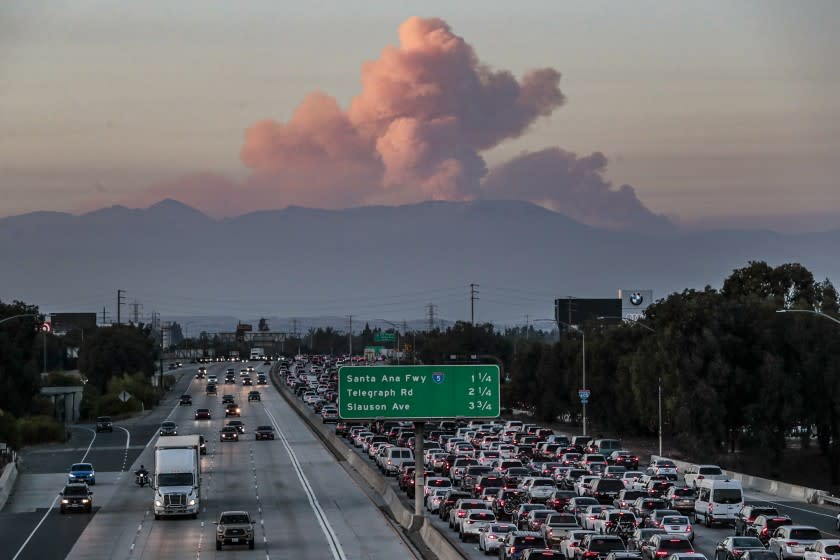L.A. wants to bulldoze Latino neighborhoods to expand a freeway. Biden shouldn't help

- Oops!Something went wrong.Please try again later.
Joe Biden's recently unveiled $2-trillion infrastructure plan is about to unleash otherworldly sums of money into transportation projects across the United States. It would devote $115 billion to road and bridge improvement projects over eight years — in addition to the billions already allotted annually through periodic federal highway bills.
Biden, however, has no intention of keeping his infrastructure plans to the business-as-usual, pave-the-freeways federal playbook. Aside from investments in green energy and electrifying the government’s vehicle fleet, Biden’s proposed budget includes $20 billion in funds to repair the damage caused to communities of color by infrastructure projects past — namely, the racially motived destruction of these communities by bigoted freeway construction.
Biden’s transportation secretary, Pete Buttigieg, has already put the brakes on a racially malignant freeway expansion in Houston that would have displaced about 1,000 predominantly Black and Latino families and businesses.
And yet if the Biden administration is committed to making sure its infrastructure plans are a solution to racial injustice, rather than a cause, there’s another freeway project it’s going to need to keep its eyes on.
Los Angeles has its own hugely problematic, arguably racist freeway expansion plan in the works. And it’s looking for a big federal check to get the job done.
Metro, L.A. County’s transit agency, is currently shopping a $5-billion plan to widen the 605, which would result in the bulldozing of hundreds of homes in Latino neighborhoods along the southeast L.A. County corridor.
Yes, we’re only months away from another fire season perfumed by the smoldering ruins of communities ravaged by climate-exacerbated catastrophes, and L.A. is still trying to expand its freeways. And it appears willing to perpetuate a legacy of racism in the process.
When L.A. built its freeway system, it rerouted the elaborate designs of freeway engineers — often at considerable expense — to avoid white neighborhoods and instead destroy thousands of homes in racially diverse communities such as Boyle Heights. Many of the freeway exiles who lost their homes wound up settling in southeast L.A. County cities such as Downey, where their neighborhoods are now once again on the chopping block.
Metro is not unaware of this history. Blogger Steve Hymon recently wrote eloquently on the agency’s website about the spotted history of the 105 freeway, including the communities of color that were bulldozed: "The 105 violated environmental laws, displaced more than 25,000 people and left behind a legacy of noise and pollution in some of Los Angeles County’s poorest neighborhoods."
Hymon's conclusion: "Let’s be honest — [the 105] would likely not be built the same way today."
And yet Metro is mulling plans to ... spend billions to obliterate Latino communities in service of car commuters.
To state what should be obvious: There is no universe where this is an acceptable option.
Under pressure from advocates such as Alex Contreras, a 26-year-old Downey resident whose family home is in the potential path of destruction, and aggressive reporting from Streetsblog L.A., Metro has offered new plans to scale back the scope of the displacement.
But hundreds of homes are still in jeopardy.
Metro has about $1 billion available for the project. According to Metro officials, it will need at least $4 billion more. And it’s hard to imagine they aren’t licking their lips at the thought of getting a piece of Biden’s $2-trillion pot of gold.
So why on earth is Metro prioritizing a problematic freeway expansion in a world where work-from-home can and should become the new normal?
In an interview, Metro officials said that L.A. County voters signed off on these plans when we passed transportation funding measures M and R. They also said that standstill freeway traffic comes with its own climate implications. And that widening the 605 won’t be a case of “induced demand” because the demand is already there. Traffic jams at the proposed work site are among the worst in the country.
Granted, not all the fault for L.A.’s automotive status quo falls on Metro. There are many reasons for freeway demand. And much of the blame falls on wealthy job centers such as Santa Monica and Beverly Hills that refuse to build enough housing for the people who are employed there, creating a cycle of displacement that pushes workers and development farther and farther away from the urban core. As long as a preference for single-family neighborhoods and individualized transport bubbles remain dominant in Southern California, traffic will stay horrific. Our fight against climate change will fail. And communities of color will be the ones to suffer most.
But at some point we need our transit agencies to draw a line in the sand. If they can’t end car-centric urban planning, they can certainly stop enabling it with freeway expansions. And if they refuse to, it’s up to Biden, Buttigieg and Congress to take their piggy bank away.
This story originally appeared in Los Angeles Times.

